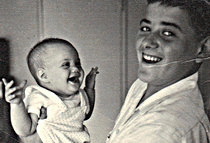According to a growing number of experts, a human's need--and search--for safety starts at conception. Studies have shown that mothers who do not want or are overwhelmed by their pregnancies induce the production of stress hormones in their newly forming babies.
Gary Sibcy, Ph.D.,co-author with Tim Clinton, of Attachments: Why You Love, Feel, and Act the Way You Do, states unequivocally that relationships--how we speak, relate, and respond to our children--are crucial to brain development. Furthermore, he emphasizes, the earlier we engage children properly in life, the more likely they are to be healthy, adaptable, and happy.
In the field of Interpersonal Neurobiology, it is becoming axiomatic that the brain is a social organ and that the relationships we experience at an early age change not only the way the brain functions but its very structure and its future function. The brain changes and forms with experience and our interpretation of those experiences based on what we see, hear, and feel around us. This particular and important feature of childhood is what experts call plasticity.
A child is not born with a fixed set of resources, not even genetically. The only thing that comes in ready to go is the brain stem, which allows us to breathe and sleep and blink without thinking. The rest of the synaptic and neural nets are wired, rewired, and wired again throughout our early lives. Eventually, those networks can become hard-wired, which is why knowing how to speak to our children is so vitally important.
Verbal First Aid� ? : "Kid Whispering" for Self-Healing and Safety
In the book Verbal First Aid� ? we take this one step further--from the principle to the everyday practice. With the careful and thoughtful use of words and the strength of our presence, we not only can we help children feel better by relating and speaking to them in certain ways, but we can literally help them heal. With our words we can address autonomic function in ways that can help them be calm, stop or slow bleeding, reduce an inflammatory response, lower their blood pressure or soothe a broken heart.
In essence, by engaging the child's mind in the process of healing, we are teaching him how to heal himself, what his own body is capable of, how his thoughts, the pictures in his mind, and his expectations have a profound impact on how he feels and how he heals.
The protocol is simple and is based on three essential elements:
- The development of rapport
- The existence of a "healing zone"
- The power of therapeutic suggestion
Rapport
Before anything we say can be considered genuinely therapeutic, we need rapport with the child or patient. From my point of view, this is the most important step, the one without which nothing else works. This is the relationship. And it is fundamental in every conceivable way.
In terms of using Verbal First Aid� ? to help children heal, this relationship or "rapport" can be built over years as it would be ordinarily with a parent. It can be built over some months as it is with many teachers. Or it can be built in seconds, the way it can be with a skilled and compassionate paramedic or firefighter.
Rapport simply means: "I am here to help you. I see your discomfort. I see you. I am here for you." Perhaps you wouldn't use those words exactly, but it is the sentiment and intention that are crucial.
Rapport is based on three points:
a) Authority
Next Page 1 | 2 | 3 | 4 | 5 | 6
(Note: You can view every article as one long page if you sign up as an Advocate Member, or higher).





